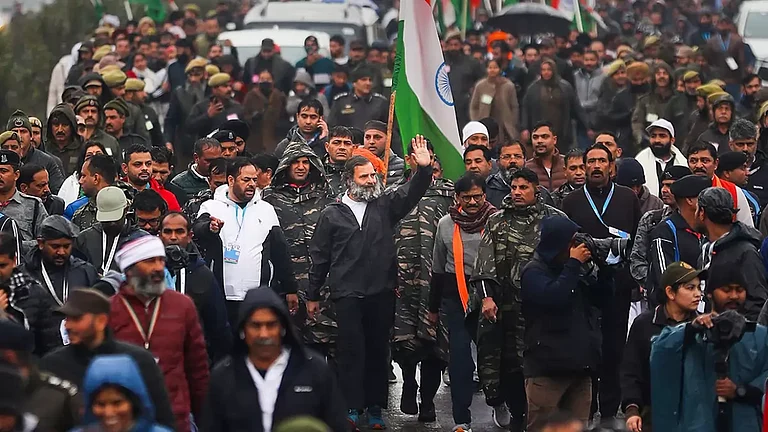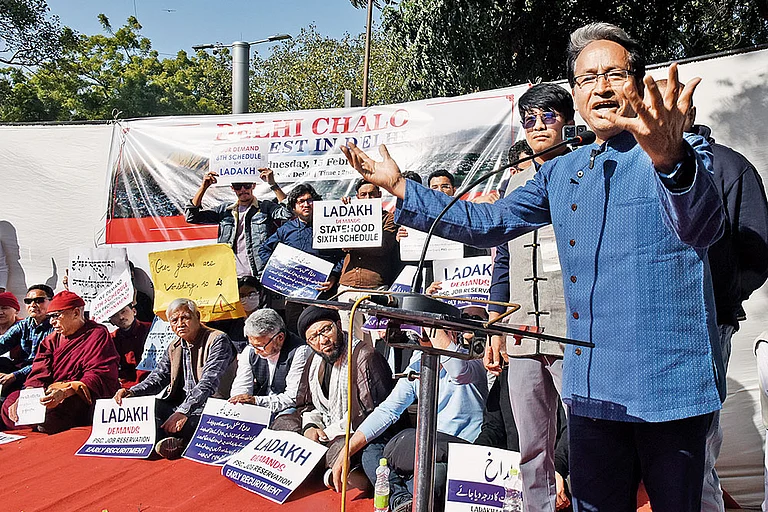Benefits under Article 371 to offer protection for land and jobs to local people of Ladakh, granting law-making powers to the two hill councils in the region, have emerged as key political solutions to address the unrest in Ladakh.
Talks are likely to be held on October 22 between the Central government and Ladakhi leadership, nearly a month after protests erupted over demands for Sixth Schedule benefits and statehood for the Union Territory.
Residents and activists in Ladakh have been seeking the Sixth Schedule benefits to frame laws to protect the land and jobs through the autonomous district councils.
Extension Of Article 371 To Ladakh Emerges A Key Solution Ahead Of MHA Talks
The extension of Article 371 and law-making powers for Ladakh's hill councils have emerged as major responses to local unrest, directly addressing demands for protection of land and jobs and autonomy of the region.
As Ladakh’s groups will begin their talks with the Centre tomorrow, the extension of benefits under Article 371 has been seen as among the key political solutions that have emerged to address the unrest in Ladakh. Other issues include granting law-making powers to the two hill councils in the region.
The Central government is set to hold talks with the leadership of Ladakh on October 22, following the September 24 violence that left four people dead and several others injured during protests over demands for Sixth Schedule benefits and statehood for the Union Territory.
Members from both the Leh Apex Body (LAB) and the Kargil Democratic Alliance (KDA) will attend the meeting with the sub-committee of the Ministry of Home Affairs (MHA) to hold discussions with the senior officials of the Union Ministry tomorrow.
After a peaceful demonstration in Leh for statehood and sixth schedule benefits, the Central government conceded a key demand and announced a judicial probe into alleged excessive force. This triggered the resumption of dialogue. Ahead of the talks, two main solutions have been set forth by the political parties: granting law-making powers to the Ladakh Autonomous Hill Development Councils (LAHDCs) of Leh and Kargil, and extending Article 371 to the Union Territory.
Tarun Chugh, BJP national general secretary, states the party is committed to safeguarding Ladakh's culture and protecting local jobs. He says their rights to land, language, and other aspects will be secured under Article 371.
Under Article 371, some laws of the parliament don’t apply to the northeastern states without the consent of the legislative assembly on matters like customary law and “ownership and transfer of land and its resources.”
A senior BJP leader says granting law-making powers to the hill councils is a solution to the region's unrest. "Currently, Ladakh does not have local law-making powers. Empowering both councils with these powers is a possible solution," he says, noting the earlier BJP promise of Sixth Schedule protections when Ladakh was part of Jammu and Kashmir. "The situation has changed now that it's a UT," the leader adds.
Ladakh was carved out as a separate UT from the erstwhile state of Jammu and Kashmir on August 5, 2019, when New Delhi abrogated Article 370 of the Indian Constitution, stripping the erstwhile state of its separate constitution and flag.
Ladakh MP Haji Haneefa emphasises that obtaining Article 371 benefits requires a legislative assembly for Ladakh. He notes this is the first meeting to discuss Ladakh's political future, and both LAB and KDA jointly support the demands for statehood and Sixth Schedule benefits.
Residents and activists seek Sixth Schedule benefits to frame laws protecting land and jobs via autonomous district councils. In addition to statehood and the Sixth Schedule, the KDA and LAB delegation will urge the Central government to create a local cadre and Public Service Commission for Ladakh to handle gazette recruitment, currently managed by UPSC, according to Haneefa.


